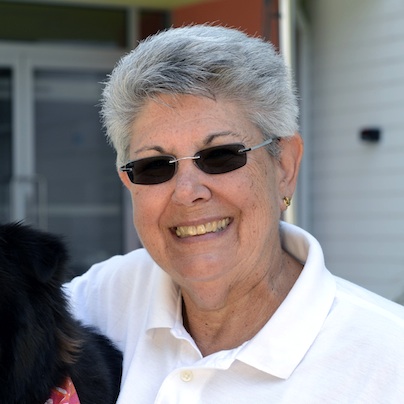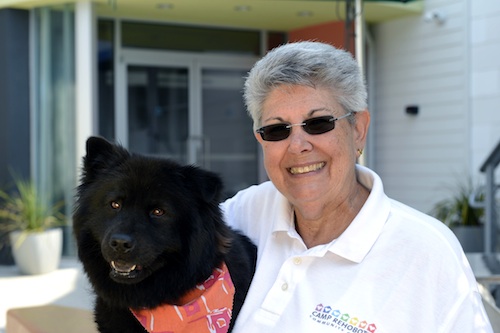Arts & Entertainment
Queery: Natalie Moss
The CAMP Rehoboth volunteer answers 20 gay questions

Natalie Moss says moving to Rehoboth Beach, Del., was “always in my master plan.” It just ended up happening a little sooner than she originally thought. And that’s fine by her.
The D.C. native and longtime resident had spent summers at the beach for decades and had her accounting clients — she’s a CPA — established enough that she no longer needed face time with them in Washington. Shortly after Sept. 11, 2001, she made the move.
“I’m so glad I did because if I’d waited, with the housing market the way it was, I never could have afforded it,” she says. “Everything worked out just right.”
The 64-year-old lesbian spent years as a buyer for women’s clothing stores and running an ice cream shop in Rockville. Business was slow in the winter months, so she did taxes and went back to school. Now she spends a lot of her time as a “full-time volunteer” as treasurer for CAMP Rehoboth. She’s been working feverishly again this year as co-chair of its annual Sundance event.
This year’s incarnation — dubbed “Legend of the Silver Rainbow” — is this weekend and features an auction, cocktails and party over two nights (Saturday and Sunday) at the Rehoboth Beach Convention Center (229 Rehoboth Ave.). Tickets are $80 for both nights or $45 for one. As always, proceeds benefit CAMP Rehoboth Community Center. Details are at camprehoboth.com.
“We could never do it without the help of the entire team,” she says. “I’ve been helping for about 20 years and it’s amazing, we get most of the same people back each year and everybody just kind of falls into a rhythm and knows exactly what needs to be done. They just fall into place and they get it. The whole thing is totally mind blowing.”
Moss and her partner of 20 years, Evelyn, live with their dog Lucilu at the beach. She enjoys spending time at the beach and great food when she’s not volunteering.
How long have you been out and who was the hardest person to tell?
I have been out since I was around 27. I really did not have a hard time telling anyone, once I decided to come out. Being gay just became a part of me, like having brown eyes. I never actually told my parents, although my brother did. My mother passed away before we had a real discussion.
Who’s your LGBT hero?
Ellen as a public figure. Steve Elkins and Murray Archibald for what they have achieved in founding and running CAMP Rehoboth.
What’s Washington’s best nightspot, past or present?
Coming out in D.C. I loved going to the bars and dancing. The best was the Grand Central, soon followed by The Other Side. I do not know too much about D.C. now since I have been in Rehoboth for the last 10 years, but in Rehoboth we always loved happy hour at Cloud 9 and the margaritas at Dos Locos.
Describe your dream wedding.
On the beach, perfect weather, tented catered delicious food and drink, surrounded by friends, great music and dancing.
What non-LGBT issue are you most passionate about?
Finding a cure for cancer. I am a cancer survivor and know so many who are touched by the disease.
What historical outcome would you change?
Not going to war in Iraq and Afghanistan. Our economy would be in much better shape without our dollars going to support wars.
What’s been the most memorable pop culture moment of your lifetime?
I have 65 years to choose from! Ellen coming out on TV. And disco, love disco. And Disney World.
On what do you insist?
Honesty
What was your last Facebook post or Tweet?
Invited everyone to Sundance 25th anniversary on Labor Day weekend.
If your life were a book, what would the title be?
“Wine, Women and Song”
If science discovered a way to change sexual orientation, what would you do?
Stay the way I am. But I wish they would discover the perfect diet pill.
What do you believe in beyond the physical world?
I am spiritual enough to “thank god” for things, but not sure I believe there is one.
What’s your advice for LGBT movement leaders?
Concentrate on getting the right people representing the states in Congress. No matter who the president is, he cannot get anything done without Congress’s support. Get the bigoted homophobic people out.
What would you walk across hot coals for?
My lovely girlfriend.
What LGBT stereotype annoys you most?
Overly swishy boys and extreme tattooed dykes.
What’s your favorite LGBT movie?
The movie “The Children’s Hour” changed my life. That is when it really hit me that I was a lesbian — I was around 13 years old. We have a great film festival here in Rehoboth and we get to see many good LGBT movies every year so I have many current favorites.
What’s the most overrated social custom?
Small talk
What trophy or prize do you most covet?
I do not really covet any prize. I just want to be known as a giving, generous and nice person.
What do you wish you’d known at 18?
I wish I had come out sooner. I wasted almost 10 years being in the closet.
Why Rehoboth?
I could go on and on, but the most important thing to me is the gay community and the work that we do at CAMP Rehoboth. If you know about the demographics that have recently been published by the Huffington Post’s “America’s Gayest Neighborhoods,” Rehoboth is ninth most popular for gay men and fifth most popular for lesbians. We have worked very hard to make this a welcoming community where gay and straight work, live and play together.
Out & About
Plan your wedding the LGBTQ way
Washington D.C. LGBTQ+ Wedding Expo scheduled for Sunday

Rainbow Wedding Network will host “Washington D.C. LGBTQ+ Wedding Expo” on Sunday, March 1 at 12:30 p.m.
Guests can meet and mingle with a curated selection of LGBTQ-welcoming wedding professionals from across the region, each ready to help bring your vision to life, and spend a beautiful afternoon exploring everything they need to create a celebration that reflects them.
There will be a relaxed, self-guided look at the Watergate’s spaces and amenities, savor signature cocktails and delicious tasting samples, and connect with other couples who are on the same journey.
Visit Eventbrite to reserve a spot.

Friday, February 27
Center Aging Monthly Luncheon With Yoga and Drag Bingo will be at 12 p.m. at the DC Center for the LGBT Community. Email Mac at [email protected] if you require ASL interpreter assistance, have any dietary restrictions, or questions about this event.
Go Gay DC will host “LGBTQ+ Community Happy Hour Meetup” at 7 p.m. at Freddie’s Beach Bar and Restaurant. This is a chance to relax, make new friends, and enjoy happy hour specials at this classic retro venue. Attendance is free and more details are available on Eventbrite.
Trans Discussion Group will be at 7 p.m. on Zoom. This group is intended to provide an emotionally and physically safe space for trans people and those who may be questioning their gender identity/expression to join together in community and learn from one another. For more details, email [email protected].
Saturday, February 28
Go Gay DC will host “LGBTQ+ Community Brunch” at 11 a.m. at Freddie’s Beach Bar & Restaurant. This fun weekly event brings the DMV area LGBTQ+ community, including allies, together for delicious food and conversation. Attendance is free and more details are available on Eventbrite.
The DC Center for the LGBT Community will host “Sunday Supper on Saturday” at 2 p.m. It’s more than just an event; it’s an opportunity to step away from the busyness of life and invest in something meaningful, and enjoy delicious food, genuine laughter, and conversations that spark connection and inspiration. For more details, visit the Center’s website.
Black Lesbian Support Group will be at 1 p.m. on Zoom. This is a peer-led support group devoted to the joys and challenges of being a Black lesbian. You do not need to be a member of the Beta Kappa Chapter or the Beta Phi Omega Sorority in order to join, but they do ask that you either identify as a lesbian or are questioning that aspect of your identity.Send an email to [email protected] to receive the zoom link.
Sunday, March 1
LGBTQ+ Community Coffee and Conversation will be at 12 p.m. at As You Are. This event is for people looking to make more friends and meaningful connections in the LGBTQ community. Attendance is free and more details are available on Eventbrite.
Monday, March 2
“Center Aging: Monday Coffee Klatch” will be at 10 a.m. on Zoom. This is a social hour for older LGBTQ+ adults. Guests are encouraged to bring a beverage of choice. For more information, contact Adam ([email protected]).
Tuesday, March 3
Universal Pride Meeting will be at 7 p.m. on Zoom. This group seeks to support, educate, empower, and create change for people with disabilities. For more details, email [email protected].
Wednesday, March 4
Job Club will be at 6 p.m. on Zoom upon request. This is a weekly job support program to help job entrants and seekers, including the long-term unemployed, improve self-confidence, motivation, resilience and productivity for effective job searches and networking — allowing participants to move away from being merely “applicants” toward being “candidates.” For more information, email [email protected] or visit www.thedccenter.org/careers.
Center Aging Women’s Social and Discussion Group will be at 6 p.m. on Zoom. This group is a place where older LGBTQ+ women can meet and socialize with one another. There will be discussion, activities, and a chance for guests to share what they want future events to include. For more information, email [email protected].
Thursday, March 5
The DC Center’s Fresh Produce Program will be held all day at the DC Center for the LGBT Community. People will be informed on Wednesday at 5 p.m. if they are picked to receive a produce box. No proof of residency or income is required. For more information, email [email protected] or call 202-682-2245.
Virtual Yoga Class will be at 7 p.m. on Zoom. This free weekly class is a combination of yoga, breathwork and meditation that allows LGBTQ+ community members to continue their healing journey with somatic and mindfulness practices. For more details, visit the DC Center’s website.
a&e features
Transmission DC breathes new life into a storied sound space
A fresh home for boundary-pushing culture on H Street

Late last year, phoenix-style, a fresh home for boundary-pushing culture arose on the H Street corridor. Transmission DC – a queer, trans, and POC-owned, operated, and centered community-focused venue – powered on in the former home to the Rock & Roll Hotel (famously, not a hotel, but very much rock & roll). Transmission (1353 H St., N.E.) arrives secure in its mandate – or even birthright – to provide a place to celebrate creativity and music through a lens of inclusivity and respect.
Transmission’s team brings experience, but also representation. Owners/partners Kabir Khanna (who is also programming director), Katii B, Ellie McDyre, and Kelli Kerrigan together previously managed 618 productions, a venue in Chinatown, crafting “some of D.C.’s freakiest parties, raves, and mosh pits” they note.
They packed up operations last fall to a space curated specifically for D.C.’s underground music and culture scene, building their efforts in Chinatown to bring in more fans in queer and POC circles.
Transmission, Khanna points out, is built on DIY values. In the music scene, DIY means that promoters and organizers – often disconnected from the mainstream and part of marginalized communities – build shows and programs collaboratively, but independently from institutions, supporting each other as smaller, independent venues close. Here, Transmission aims to ensure that those putting together these underground inclusive shows have a more permanent and stable home, can have access to resources, and can provide more sustainable income to artists. “We’re trying to get more people to support and enjoy the music, and also give artists and organizers within the DIY community more structure and a larger cut,” says Khanna.
Khanna also notes that Transmission operates “under the principles of safety, inclusivity, and respect.” McDyre added that even at venues that claim inclusivity, that statement might not take place in practice. We’re “not just pitting up a rainbow flag,” says McDyre, but as some of the owners are trans and POC, audiences can see themselves reflected at the top.
Much like the DIY nature of the music community, the Transmission owners brought a DIY ethos to turning around their space.
In March 2020 – the height of COVID lockdowns – Rock & Roll Hotel suddenly shuttered, though not due to the pandemic; instead, the venue claimed that decreasing sales and increasing competition led to the closure. For 14 years, it was the central spot for cheap beer and lesser-known and celebrated acts. The space stood vacant for more than five years, until Transmission turned the power back on.
“When we got into the space, it was effectively abandoned for years,” says Khanna. “There was a ton of mold, and paint primer covering all surfaces. It was nearly falling apart.” Khanna noted that many music venues like this one, regardless of how well it was maintained, “get the shit kicked out of it,” given the nature of shows. The team called in mold removal contractors, ripped up most of the floorboards, and started fresh.
Transmission’s first floor is styled as a stripped-down black box: the better to take in the music. “It’s minimal on purpose to act as a canvas for set design and music,” without a specific aesthetic, says Khanna. Moving upstairs, the second floor has been opened up, removing some walls, and now has a larger dance area than the first floor. Beyond the first two performance levels, and a holdover from Rock & Roll Hotel, is the rooftop. Though without a stage, the rooftop space is filled with murals splashed across the walls, with a full bar. Transmission’s current capacity is 496, but the team is looking to grow that number. Transmission will also leverage the full kitchen that Rock & Roll Hotel operated, bringing in Third Hand Kitchen to offer a variety of food, including vegan and vegetarian options.
Khanna pointed out an upcoming show reflective of Transmission’s inclusive ethos: Black Techo Matters on Feb. 27. The event is set to be “a dynamic, collaborative night of underground electronic music celebrating Black History Month.” Khanna says that techno came from Black music origins, and this event will celebrate this genesis with a host of artists, including DJ Stingray 313, Carlos Souffront, and Femanyst.



















